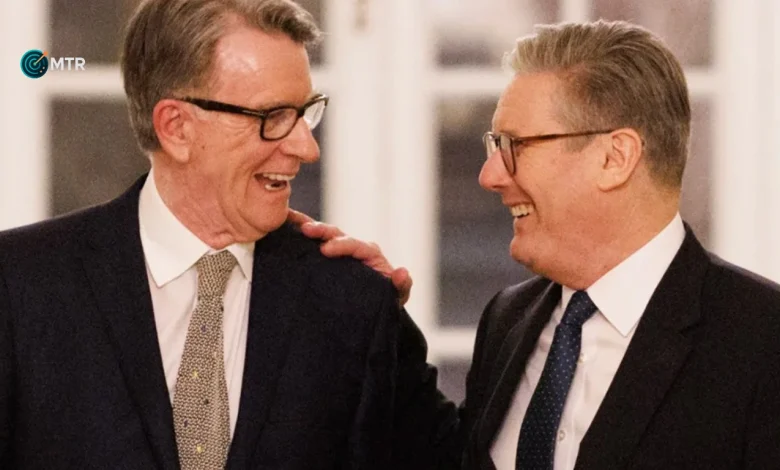Tony Blair’s Meeting with Jeffrey Epstein: Unveiling the 2002 Downing Street Encounter

In May 2002, then-Prime Minister Tony Blair met with Jeffrey Epstein at Downing Street, following lobbying efforts by Lord Peter Mandelson. This meeting occurred six years before Epstein’s criminal activities became public knowledge. Documents revealing the meeting were released by the National Archives after being previously withheld due to concerns over UK-US relations.
Key Takeaways:
- Tony Blair met Jeffrey Epstein in May 2002 at Downing Street.
- The meeting was facilitated by Lord Peter Mandelson, who described Epstein as “safe.”
- The encounter took place six years before Epstein’s 2008 conviction for soliciting prostitution from a minor.
- Documents were released by the National Archives following a Freedom of Information request.
- The meeting was initially blocked from public knowledge due to potential impacts on UK-US relations.
Factual Recap
In a revelation that has sparked renewed interest, it has been confirmed that former UK Prime Minister Tony Blair met with the controversial financier Jeffrey Epstein at Downing Street on May 14, 2002. This meeting was orchestrated through the efforts of Lord Peter Mandelson, who, in an email to Blair’s chief of staff Jonathan Powell, described Epstein as “a friend of mine” and “safe”. The meeting occurred long before Epstein’s criminal activities came to light, with his conviction for soliciting prostitution from a minor not occurring until June 2008.
A memo written by senior civil servant Matthew Rycroft, dated the same day as the meeting, briefed Blair about Epstein, referring to him as a “super-rich” financial adviser. According to a spokesperson for Blair, the meeting lasted less than 30 minutes and focused on US and UK politics. “As far as he can remember, Mr Blair met with him for less than 30 minutes in Downing Street in 2002, and discussed US and UK politics. He never met or engaged with him subsequently,” the spokesperson stated.
The release of documents detailing this meeting was previously blocked by government officials due to concerns about the potential impact on UK-US relations. However, the National Archives released the documents following a Freedom of Information request, coinciding with the sacking of Lord Mandelson as US ambassador after new revelations about his friendship with Epstein .
Mini Timeline
- May 7, 2002: Lord Peter Mandelson emails Jonathan Powell, Blair’s chief of staff, advocating for a meeting between Tony Blair and Jeffrey Epstein, describing Epstein as “safe” and a friend of ex-US President Bill Clinton.
- May 14, 2002: Tony Blair meets Jeffrey Epstein at Downing Street. A memo by Matthew Rycroft briefs Blair on Epstein’s background prior to the meeting.
- June 2008: Jeffrey Epstein pleads guilty to soliciting prostitution from a minor, marking the beginning of his legal troubles.
- Recent: Documents about the 2002 meeting are released by the National Archives after being previously withheld, following the sacking of Lord Mandelson as US ambassador.
Legal Challenges
The legal implications surrounding the meeting between Tony Blair and Jeffrey Epstein are primarily historical, given that Epstein’s criminal activities were not yet public knowledge at the time. However, the release of the documents under the Freedom of Information request highlights ongoing legal challenges related to transparency and accountability in government dealings. The initial withholding of these documents due to concerns about diplomatic relations underscores the delicate balance between legal transparency and international diplomacy .
Political Reactions
The political fallout from the revelation of Tony Blair’s meeting with Jeffrey Epstein has been significant. The involvement of Lord Peter Mandelson, who described Epstein as “safe,” raises questions about the judgment of political figures in associating with individuals who later became notorious for criminal activities. The dismissal of Mandelson as US ambassador following the release of these documents further illustrates the political repercussions and the scrutiny faced by those involved .
International Impact
The meeting between Blair and Epstein, facilitated by Mandelson, has broader implications for international relations, particularly between the UK and the US. The initial decision to block the release of documents due to potential impacts on UK-US relations highlights the sensitivity of diplomatic ties and the influence of financial elites in shaping international politics. The eventual release of these documents may affect the perception of UK political figures on the global stage, particularly in the context of their associations with controversial individuals .
Effects on U.S. Universities
While the direct impact on U.S. universities is not detailed in the available sources, Epstein’s connections to academic institutions have been well-documented. His financial contributions to various universities have come under scrutiny, leading to broader discussions about the ethics of accepting donations from individuals with questionable backgrounds. The revelation of his meeting with Blair may further influence how universities evaluate potential donors and their affiliations .
Impact on Outsourcing Firms
The broader context of Epstein’s financial dealings and connections to influential figures could have implications for outsourcing firms, particularly those involved in international finance and advisory services. The scrutiny of Epstein’s associations may lead to increased regulatory oversight and due diligence requirements for firms operating in similar sectors. This could impact their operations and strategic partnerships, as they navigate the complexities of global finance and political scrutiny .
Disagreements and Certainties
The sources agree on the occurrence of the meeting between Blair and Epstein, facilitated by Mandelson, but there is some ambiguity regarding the motivations behind the meeting and the extent of Epstein’s influence. While Mandelson described Epstein as “safe” and a “friend,” the exact nature of their relationship and Epstein’s role as a “scientific catalyst/entrepreneur” remains somewhat unclear . The certainty lies in the documented meeting and the subsequent political fallout, particularly concerning Mandelson’s dismissal.
FAQ
Why was the meeting between Tony Blair and Jeffrey Epstein significant?
The meeting is significant due to Epstein’s later criminal convictions and his connections to influential figures, raising questions about political judgment and the influence of financial elites.
What was the outcome of the meeting?
The meeting was brief and focused on political discussions. Blair’s spokesperson stated that there were no further engagements with Epstein.
How did the meeting come to light?
The meeting details were released by the National Archives following a Freedom of Information request, despite initial government resistance due to potential diplomatic repercussions.
What are the implications for domestic companies like Huawei?
While not directly related, the situation highlights the challenges companies face in navigating political scrutiny and maintaining market positions amid geopolitical tensions.
Sources
news.google.com




